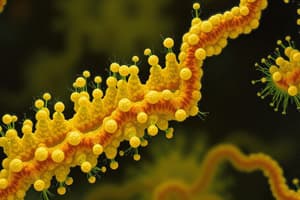Podcast
Questions and Answers
What is the primary focus of microbiology as defined in the content?
What is the primary focus of microbiology as defined in the content?
- The study of viruses only
- The study of animal diseases
- The study of cellular organisms
- The study of microorganisms (correct)
Who is credited with disproving the concept of spontaneous generation through the use of fly eggs?
Who is credited with disproving the concept of spontaneous generation through the use of fly eggs?
- John Needham
- Louis Pasteur
- Lazzaro Spallanzani
- Francesco Redi (correct)
What was John Needham's conclusion regarding boiled hay and microorganisms?
What was John Needham's conclusion regarding boiled hay and microorganisms?
- Microorganisms could arise from non-living matter. (correct)
- Boiled hay did not cause microbial growth.
- Boiled hay contains microbes.
- Boiling would destroy all microorganisms.
What did Lazzaro Spallanzani demonstrate regarding the growth of microorganisms?
What did Lazzaro Spallanzani demonstrate regarding the growth of microorganisms?
What was a significant outcome of Louis Pasteur's swan-neck flask experiment?
What was a significant outcome of Louis Pasteur's swan-neck flask experiment?
What profession did Louis Pasteur hold?
What profession did Louis Pasteur hold?
How did early theories attribute infectious diseases before the connection to microorganisms was established?
How did early theories attribute infectious diseases before the connection to microorganisms was established?
What major public health advance is Louis Pasteur credited with establishing?
What major public health advance is Louis Pasteur credited with establishing?
What was the focus of Louis Pasteur's work related to fermentation?
What was the focus of Louis Pasteur's work related to fermentation?
What significant contribution did Joseph Lister make to surgery?
What significant contribution did Joseph Lister make to surgery?
Which disease did Robert Koch specifically link to its causative agent using Koch's postulates?
Which disease did Robert Koch specifically link to its causative agent using Koch's postulates?
What is one of the primary limitations of Koch's postulates?
What is one of the primary limitations of Koch's postulates?
What type of microbe did Koch establish a significant relationship with in his work on anthrax?
What type of microbe did Koch establish a significant relationship with in his work on anthrax?
What is the purpose of Koch's postulates?
What is the purpose of Koch's postulates?
Which of the following aspects of infection control did Joseph Lister NOT focus on?
Which of the following aspects of infection control did Joseph Lister NOT focus on?
In which year did Robert Koch receive the Nobel Prize for his work on tuberculosis?
In which year did Robert Koch receive the Nobel Prize for his work on tuberculosis?
What does the term 'pure culture microbiology' refer to in the context of Koch's work?
What does the term 'pure culture microbiology' refer to in the context of Koch's work?
What branch of science does microbiology focus on?
What branch of science does microbiology focus on?
What did Louis Pasteur demonstrate about microbes in relation to fermentation?
What did Louis Pasteur demonstrate about microbes in relation to fermentation?
What did the Swan-Necked Flask experiments by Louis Pasteur ultimately show?
What did the Swan-Necked Flask experiments by Louis Pasteur ultimately show?
Which early scientist argued that microorganisms could arise from non-living matter through observation?
Which early scientist argued that microorganisms could arise from non-living matter through observation?
How did Lazzaro Spallanzani's experiments challenge the idea of spontaneous generation?
How did Lazzaro Spallanzani's experiments challenge the idea of spontaneous generation?
What was a prevailing belief about the cause of infectious diseases before the link to microorganisms was established?
What was a prevailing belief about the cause of infectious diseases before the link to microorganisms was established?
What significant outcome did Louis Pasteur achieve by establishing the Pasteur Institute in 1888?
What significant outcome did Louis Pasteur achieve by establishing the Pasteur Institute in 1888?
What did Francesco Redi's experiments primarily challenge in the context of spontaneous generation?
What did Francesco Redi's experiments primarily challenge in the context of spontaneous generation?
Which assertion about the development of techniques for studying microbes is correct?
Which assertion about the development of techniques for studying microbes is correct?
What significant contribution did Robert Koch establish in microbiology?
What significant contribution did Robert Koch establish in microbiology?
Which microorganism did Koch specifically link to tuberculosis using his postulates?
Which microorganism did Koch specifically link to tuberculosis using his postulates?
What was a primary benefit of Joseph Lister's antiseptic surgery system?
What was a primary benefit of Joseph Lister's antiseptic surgery system?
What is a major limitation of Koch's postulates?
What is a major limitation of Koch's postulates?
Which method did Robert Koch use to connect specific microorganisms to diseases?
Which method did Robert Koch use to connect specific microorganisms to diseases?
What was a key finding of Louis Pasteur that helped the wine industry?
What was a key finding of Louis Pasteur that helped the wine industry?
What did Koch establish as one of his key contributions to microbiology?
What did Koch establish as one of his key contributions to microbiology?
What is one way that modern methods overcome the limitations of Koch's postulates?
What is one way that modern methods overcome the limitations of Koch's postulates?
Flashcards are hidden until you start studying
Study Notes
Introduction to Microbiology
- Microbiology is the study of microorganisms, including bacteria, viruses, and fungi.
- Microorganisms play crucial roles in diverse ecosystems and human health.
- Key figures include Dr. Madikay Senghore, a researcher in microbial genomics and infectious diseases.
Course Outline
- Topics include microbial structure, growth control, food microbiology, and industrial microbiology.
- Assessment consists of multiple quizzes and midterm/final exams, focused on problem-solving and concept application.
Historical Perspectives
- Spontaneous Generation Debate: Early belief that life arose from non-living matter.
- Francesco Redi disproved it using maggots and decaying meat.
- John Needham and Lazzaro Spallanzani contributed to the discussion through experiments with boiled hay.
- Louis Pasteur: Established that microorganisms are present in air and refuted spontaneous generation through his swan-neck flask experiments. He pioneered fermentation principles and created the rabies vaccine.
The Role of Microorganisms in Disease
- Infectious diseases were originally attributed to supernatural forces or imbalances of bodily fluids.
- Advances in microbiological techniques facilitated the understanding of microorganism-disease connections.
- Joseph Lister: Introduced antiseptic surgical methods that reduced infection rates.
Key Contributors
- Robert Koch:
- Founder of pure culture microbiology, developed Koch's postulates to link specific microorganisms to specific diseases.
- Notable work includes demonstrating the link between Bacillus anthracis and anthrax, and Mycobacterium tuberculosis and tuberculosis.
Koch's Postulates
- Criteria established by Koch to confirm the association between a microorganism and a disease:
- The microorganism must be found in abundance in diseased organisms.
- It must be isolated from a diseased organism and grown in pure culture.
- The cultured microorganism should cause disease when introduced into a healthy organism.
- It must be re-isolated from the inoculated, diseased organism.
Limitations of Koch’s Postulates
- Some organisms cannot be cultured outside their host.
- Ethical concerns arise when using humans in postulate experimentation.
- Molecular and genetic techniques may provide alternative approaches to establishing links between microbes and diseases.
Introduction to Microbiology
- Microbiology is the study of microorganisms, including bacteria, viruses, and fungi.
- Microorganisms play crucial roles in diverse ecosystems and human health.
- Key figures include Dr. Madikay Senghore, a researcher in microbial genomics and infectious diseases.
Course Outline
- Topics include microbial structure, growth control, food microbiology, and industrial microbiology.
- Assessment consists of multiple quizzes and midterm/final exams, focused on problem-solving and concept application.
Historical Perspectives
- Spontaneous Generation Debate: Early belief that life arose from non-living matter.
- Francesco Redi disproved it using maggots and decaying meat.
- John Needham and Lazzaro Spallanzani contributed to the discussion through experiments with boiled hay.
- Louis Pasteur: Established that microorganisms are present in air and refuted spontaneous generation through his swan-neck flask experiments. He pioneered fermentation principles and created the rabies vaccine.
The Role of Microorganisms in Disease
- Infectious diseases were originally attributed to supernatural forces or imbalances of bodily fluids.
- Advances in microbiological techniques facilitated the understanding of microorganism-disease connections.
- Joseph Lister: Introduced antiseptic surgical methods that reduced infection rates.
Key Contributors
- Robert Koch:
- Founder of pure culture microbiology, developed Koch's postulates to link specific microorganisms to specific diseases.
- Notable work includes demonstrating the link between Bacillus anthracis and anthrax, and Mycobacterium tuberculosis and tuberculosis.
Koch's Postulates
- Criteria established by Koch to confirm the association between a microorganism and a disease:
- The microorganism must be found in abundance in diseased organisms.
- It must be isolated from a diseased organism and grown in pure culture.
- The cultured microorganism should cause disease when introduced into a healthy organism.
- It must be re-isolated from the inoculated, diseased organism.
Limitations of Koch’s Postulates
- Some organisms cannot be cultured outside their host.
- Ethical concerns arise when using humans in postulate experimentation.
- Molecular and genetic techniques may provide alternative approaches to establishing links between microbes and diseases.
Studying That Suits You
Use AI to generate personalized quizzes and flashcards to suit your learning preferences.




